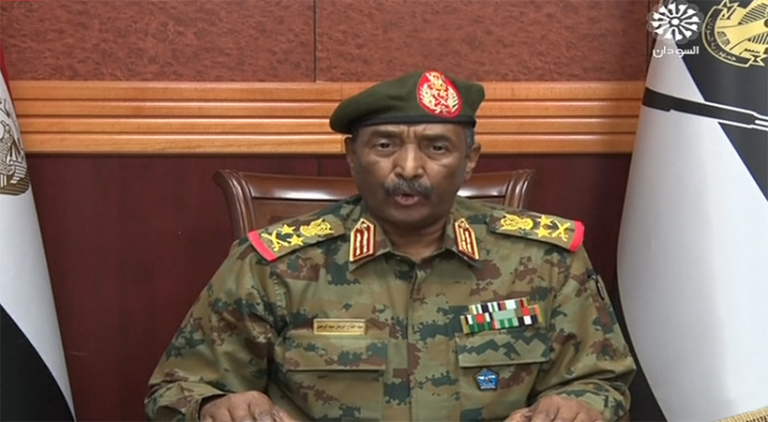
We have seen this before: military officers in the Arab world not quite enamored with sharing power with civilians—let alone ceding it to them peacefully—show their mettle. General Abdel-Fattah al-Burhan, the head of Sudan’s Sovereignty Council, which constitutes a lead civilian-military institutional setup, staged a coup and scuttled an agreement by which he would cede the presidency of the council in November to a civilian. Army troops and police arrested civilian members of the council, including Prime Minister Abdalla Hamdok, and confronted thousands of protesters in the capital. As typical of such moves by military officers trying to appear in democratic garb, Burhan announced that the military will lead a transitional period until July 2023, when parliamentary elections could be held and a new government installed.
Tensions between the military institution and civilians began to show early on in the transitional process after the army pulled its support from former dictator Omar al-Bashir in April 2019. The Forces of Freedom and Change (FFC), a coalition of civilian political groups, demanded a full return to democracy, but the military insisted on staying on as guardian of the transition. In the end, the two agreed on a provisional constitutional declaration for sharing power according to which General Burhan would lead the Sovereignty Council and then cede that position to a civilian who would lead it for another 18 months. But since the agreement was signed in July 2019, the military institution has acted as if it were not interested in allowing its star to dim and indeed showed its anti-democratic tendencies on many occasions, especially its desire to remain in full control.
It is hard to see how Burhan’s move could help settle Sudan’s political environment or fix the ailing economy. The fundamental differences between officers and civilians have always been about implementing the terms of the democratic process outlined by the 2019 agreement. For 30 years prior, General Bashir had expropriated the country’s political space and installed his loyalists in the government, military, and governorates. Burhan today, with the assistance of second-in-command General Mohamed Hamdan Dagalo (known as Hemedti, who refuses to integrate his Rapid Deployment Forces into the army), has followed what Bashir before him had done. In addition to dismissing the government and arresting the prime minister, Burhan has declared a state of emergency, suspended parts of the constitution, relieved provincial governors of their duties, and shut down the internet, among other serious acts.
Those Sudanese who had hoped that military officers may be reasoned with, on the road to a full transition to democracy, should now be worried that Burhan—or Hemedti, once he finds an opportunity to depose his boss—is on his way to reestablishing full authoritarian rule. To be sure, the FFC and the rebel groups who demonstrated their support for the military in a sit-in at the presidential palace earlier in October 2021 are likely to be very disappointed. Commanding tens of thousands of soldiers and commandeering all authority in the country, the military in Sudan, as on previous occasions, is willing to sacrifice the interests of the Sudanese people in a functioning democracy and a flourishing economy on the altar of its ultimate ambition of remaining in control, civilian support or partnership be damned.
Now it falls mainly to the Sudanese supporters of democracy, a majority that showed its mettle in demonstrations that forced the ouster of Omar al-Bashir, to show that they again can dictate the political future of their country. They will need help from international actors such as the United States and European countries. Alas, no such help is likely to come from the authoritarianism-afflicted Arab world; in fact, it is not hard to imagine that Arab leaders are looking with satisfaction at what is taking place in Khartoum today.
The task for Sudan’s pro-democracy movement is undoubtedly harder today since military officers have finally shed all pretenses of adhering to a democratic process and thrown their weight behind scuttling it. The most important lesson for pro-democracy forces in Sudan is not to trust again any promises the military institution makes, including those about a transitional period until July 2023. If the street were instrumental in toppling the Bashir dictatorship in 2019, it again has the power to derail Burhan’s putsch and chart the way to the democratic future everyone sought at the time.

